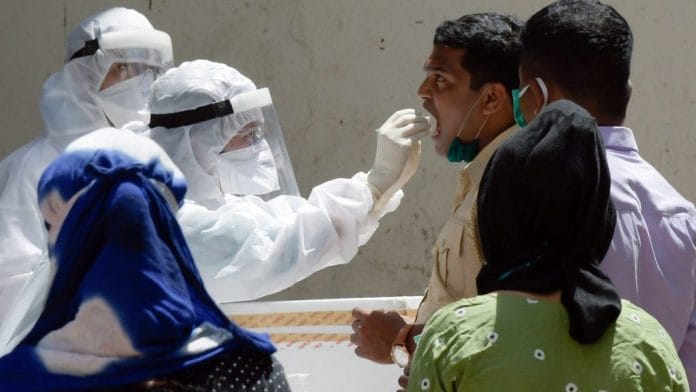New Delhi: The Lancet Citizens Commission on Reimagining India’s Health System has proposed eight recommendations for both central and state governments to address the Covid-19 surge in India.
The commission was launched in December 2020 to lay out a roadmap for India to achieve universal health coverage in the next 10 years. It includes noted personalities such as vaccinologist Gagandeep Kang, president of Centre for Policy Research Yamini Aiyar, executive chairperson of Biocon Kiran Mazumdar Shaw, cardiac surgeon Dr Devi Shetty, among others.
They have made eight recommendations, in an article published in The Lancet journal Wednesday, that both the Centre and state government can take as urgent steps to curb the loss of life and the suffering caused by the aggressive second wave of the pandemic.
The first recommendation is the decentralisation of health services. The commission suggested that district-level working groups that have autonomy to respond to changing situations should be empowered to receive funds and resources.
“A one-size-fits-all approach is untenable since the numbers of COVID-19 cases and health services differ substantially from district to district,” the article noted.
The second recommendation focused on a transparent national pricing policy and caps on the prices of all essential health services. These include hospital care, essential medicines, oxygen and ambulances.
The commission further noted that all local governments must be allocated their grants as recommended by the 15th Finance Commission.
Also read: Junior doctors ‘hurt’ over being disengaged by GTB, hospital now holds process for others
Transparency in data, vaccines, cash transfers
The commission, which has 21 members, also highlighted that clear, evidence-based information on Covid management should be circulated and then implemented. This information should also explain what not to do.
It further recommended that all human resources across sectors of the health system, including from the private sector, should be marshalled for the Covid response. They should be given sufficient personal protective equipments, insurance and mental health support. Furthermore, besides deploying final-year medical and AYUSH students, governments should also deploy final-year nursing and paramedical students.
Focusing on vaccinations, the commission said that central systems should procure and distribute Covid vaccines free of cost. They noted that the present system of state governments procuring them is not viable. “Vaccination is a public good and should not be left to market mechanisms.”
The other three recommendations were on community engagement and participation for Covid response in India, transparency in government data collection and modelling to enable districts to proactively prepare for the likely caseloads in the coming weeks.
And finally, the Lancet panel called for cash transfers to workers in the informal economy who lost their jobs because of the pandemic. It noted that irrespective of status of contracts, formal sector employers must retain all workers.
“There is still time to stem the haemorrhage of life and the suffering caused by COVID-19 in India. We call on the central and state governments to act with urgency and in solidarity with each other and across sectors to address one of the greatest humanitarian crises facing the country since its independence,” wrote the commission.
According to Poonam Mutrreja, executive director of the Population Foundation of India and a member of the commission, Covid is the most serious crisis independent India has faced, especially as it makes inroads into the rural populace, where 65 per cent people live.
“We need to enable our country’s innate resilience to kick in and hope that these eight steps will go a long way towards providing that support. All of us and our organisations look forward to partnering with the government and enabling our most vulnerable to survive this pandemic. The world is looking to see how India comes out of this crisis,” Mutrreja said in a statement.
Also read: SII begins manufacturing, stockpiling 2nd Covid vaccine Covovax after Modi govt nod






